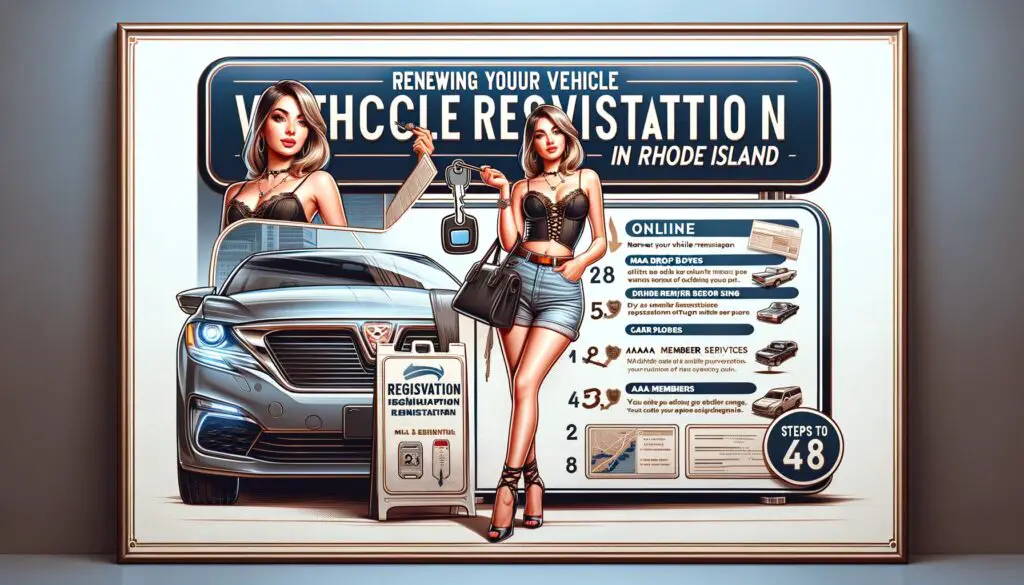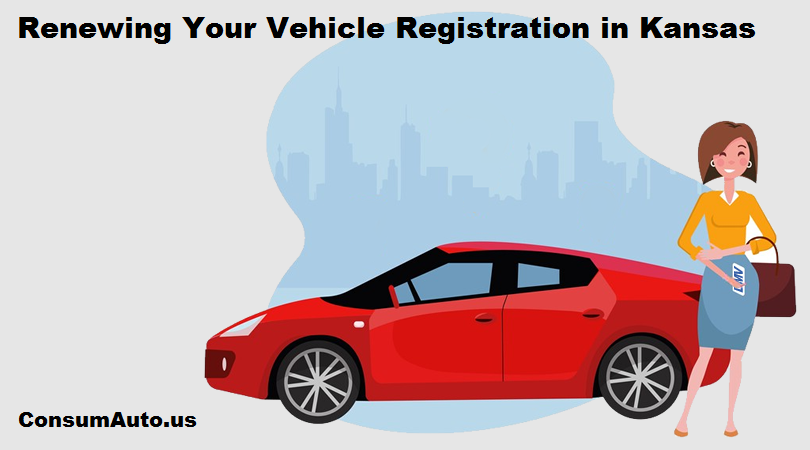In this comprehensive guide, we will walk you through the step-by-step process of renewing your vehicle registration in Rhode Island. Our goal is to provide you with clear and concise instructions so you can easily navigate the renewal process and ensure your vehicle remains legally registered. By following these guidelines, you’ll be able to complete your registration renewal hassle-free, avoiding late fees and potential legal issues.
I. Here are the steps on how to renew your vehicle registration in Rhode Island:
- Check your expiration date. Your registration renewal notice will be mailed to you about 60 days before your registration expires. If you don’t receive a notice, you can check your expiration date online or by calling the Rhode Island Division of Motor Vehicles (DMV).
- Gather your paperwork. You will need the following information to renew your registration:
- Your vehicle’s registration plate number
- Your vehicle’s title number
- Your vehicle’s insurance information
- Your odometer reading

Rhode Island DMV Registration Renew - Your payment method (credit card or check)
- Renew your registration online. This is the easiest and quickest way to renew your registration. You can do it at the Rhode Island DMV website.
- Renew your registration in person. You can renew your registration in person at any Rhode Island DMV branch office. You will need to bring all of your paperwork with you.
- Renew your registration by mail. You can also renew your registration by mail. You will need to download the appropriate form from the Rhode Island DMV website and mail it in with your payment.
Late fees
If you renew your registration after it has expired, you will be charged a late fee. The late fee is $10 for the first 30 days after your registration expires, and $20 for each additional day.
What to do if your registration is expired
If your registration is expired, you can still drive your vehicle. However, you will be subject to a fine if you are pulled over by the police. You can also be ticketed for driving with an expired registration.
To renew your expired registration, you will need to go to a Rhode Island DMV branch office. You will need to pay the late fee, as well as the regular registration renewal fee.
Here are some additional tips for renewing your vehicle registration in Rhode Island:
- Make sure you have all of the required paperwork before you start the renewal process.
- If you are renewing your registration online, make sure you have a printer. You will need to print out your receipt and registration credential.
- If you are renewing your registration by mail, make sure you send your payment in a check or money order. The Rhode Island DMV does not accept cash or credit cards through the mail.
- If you are renewing your registration in person, be prepared to wait in line. Rhode Island DMV branch offices can get busy, especially during peak times.
II. Understanding Rhode Island Vehicle Registration
- What is Vehicle Registration?Vehicle registration is a legal requirement that serves as proof of ownership and authorization to operate a motor vehicle on public roads. It includes essential information about your vehicle, such as its make, model, year, and vehicle identification number (VIN).
- Types of Vehicles Requiring Registration in Rhode IslandIn Rhode Island, most vehicles are required to be registered, including cars, trucks, motorcycles, trailers, and recreational vehicles. Exemptions may apply to certain types of vehicles, such as farm tractors or construction equipment.
- Registration Periods and Expiration DatesYour vehicle registration is valid for a specific period, usually one year. It’s important to keep track of your registration’s expiration date to ensure timely renewal.
- Required Documents for Registration RenewalTo renew your vehicle registration, you will need the following documents:
- Your vehicle’s registration plate number
- Your vehicle’s title number
- Your vehicle’s insurance information
- Your odometer reading
- Your preferred payment method (credit card or check)
III. Steps for Renewing Your Rhode Island Vehicle Registration
A. Online Renewal Process
- Creating an Online AccountStart by visiting the official Rhode Island DMV website https://dmv.ri.gov/ . If you don’t have an account, you’ll need to create one using your personal information.
- Providing Vehicle InformationEnter your vehicle’s registration plate number, title number, insurance details, and odometer reading. Ensure that all information is accurate and up-to-date.
- Payment and ConfirmationComplete the payment process using your preferred method. Double-check all details before submitting. Once the payment is confirmed, you will receive a receipt and a registration credential that you can print for your records.
B. In-Person Renewal
- Selecting a DMV OfficeLocate a convenient Rhode Island DMV branch office near you. Consider checking the office’s operating hours and any appointment requirements to save time.
- Required Documents and FormsGather all necessary documents, including your vehicle’s information, insurance details, and payment method. Fill out any required forms provided by the DMV.
- Waiting Times and AppointmentsBe prepared for potential wait times, especially during peak hours. Arriving early or scheduling an appointment can help streamline the process.
IV. Eligibility and Requirements for Renewal
- Renewal Timeframes Based on Vehicle TypesDifferent vehicle types may have varying renewal timeframes. It’s crucial to know the specific deadlines for your vehicle to avoid late fees.
- Address and Insurance UpdatesEnsure your address and insurance information are accurate and current. Updating this information may be required during the renewal process.
- Compliance with Emissions and Safety StandardsSome vehicles may need to undergo emissions testing or safety inspections before renewal. Make sure your vehicle meets the necessary standards.
V. Common Mistakes to Avoid During Renewal
- Incorrect Personal InformationProviding inaccurate personal or vehicle information can lead to processing delays or errors in your renewal.
- Missing or Incomplete DocumentationFailing to gather all required documents can result in delays or even rejection of your renewal application.
- Ignoring Emissions and Inspection RequirementsNeglecting emission testing or safety inspections can hinder your renewal process. Make sure your vehicle is compliant with these regulations.
VI. Benefits of Timely Renewal
- Avoiding Late Fees and PenaltiesRenewing your registration on time helps you avoid unnecessary late fees and penalties that can accumulate over time.
- Maintaining Legal Driving StatusTimely renewal ensures that you are legally authorized to operate your vehicle on Rhode Island roads without any interruptions.
- Ensuring Proper Insurance CoverageRegistration renewal often requires you to provide updated insurance information, helping you maintain proper coverage.
VII. Frequently Asked Questions (FAQs)
1. What is the deadline for renewing vehicle registration in Rhode Island?
The renewal deadline varies depending on your vehicle type and registration expiration date. It’s essential to check your renewal notice or verify online to determine your specific deadline. Renewing before the expiration date is recommended to avoid late fees.
2. Can I renew my registration online if my address has changed?
Yes, you can renew your registration online even if your address has changed. However, make sure to update your address information during the renewal process to ensure you receive your updated registration credentials at the correct location.
3. What documents do I need to provide for registration renewal?
For registration renewal, you will need the following documents:
- Vehicle registration plate number
- Vehicle title number
- Vehicle insurance information
- Odometer reading
- Preferred payment method (credit card or check)
4. Is emissions testing required for registration renewal?
Emissions testing may be required for certain vehicles as part of the renewal process. Make sure to verify whether your vehicle needs an emissions test based on its type and model year. Compliance with emissions standards is crucial for a successful renewal.
5. How can I check the status of my renewal application?
You can check the status of your renewal application online through the Rhode Island DMV website. This feature allows you to track the progress of your renewal and confirm when your updated registration credentials will be mailed to you.
6. What are the accepted payment methods for online renewal?
When renewing your registration online, you can use a credit card or an electronic check (E-check) as your preferred payment method. Ensure that you have the necessary funds available and provide accurate payment information.
7. Can someone else renew my registration on my behalf?
Yes, another individual can renew your registration on your behalf, such as a family member or a friend. However, they will need to provide the required documents and information mentioned earlier to complete the renewal process.
8. Is there a grace period for late renewal?
While there isn’t a specific grace period for late renewal, Rhode Island law provides a 30-day window after the registration expiration date to renew your registration without incurring additional penalties. It’s best to renew as soon as possible to avoid any fees.
9. How do I transfer my registration to a new vehicle?
If you have purchased a new vehicle and wish to transfer your existing registration, you can do so at a Rhode Island DMV office. You will need to provide the required documents for both your current and new vehicles and follow the necessary steps for the transfer.
10. What should I do if I never received a renewal notice?
If you haven’t received your renewal notice, you can still renew your registration by checking the expiration date online or contacting the Rhode Island Division of Motor Vehicles (DMV). Ensure you have the necessary information and documents to complete the renewal process.
VIII. Tips for a Smooth Renewal Experience
- Keeping Track of Renewal DatesMark your calendar with your vehicle’s registration expiration date to ensure you don’t miss the deadline.
- Organizing Necessary DocumentsCreate a checklist of required documents to ensure a seamless renewal process.
- Utilizing Online ResourcesTake advantage of online tools and resources provided by the Rhode Island DMV to streamline your renewal.
IX. Conclusion
In conclusion, renewing your vehicle registration in Rhode Island is a straightforward yet crucial process to ensure your vehicle remains legally authorized for road use. By following the steps outlined in this guide and adhering to the provided tips, you can confidently complete your renewal on time, avoiding unnecessary fees and legal complications. Stay proactive, organized, and informed to enjoy stress-free and compliant driving experiences.
We hope you have understood how to renew a car registration in Rhode Island. Yes, it might seem a bit complicated but the process is mandatory and important for safeguarding your vehicle.










